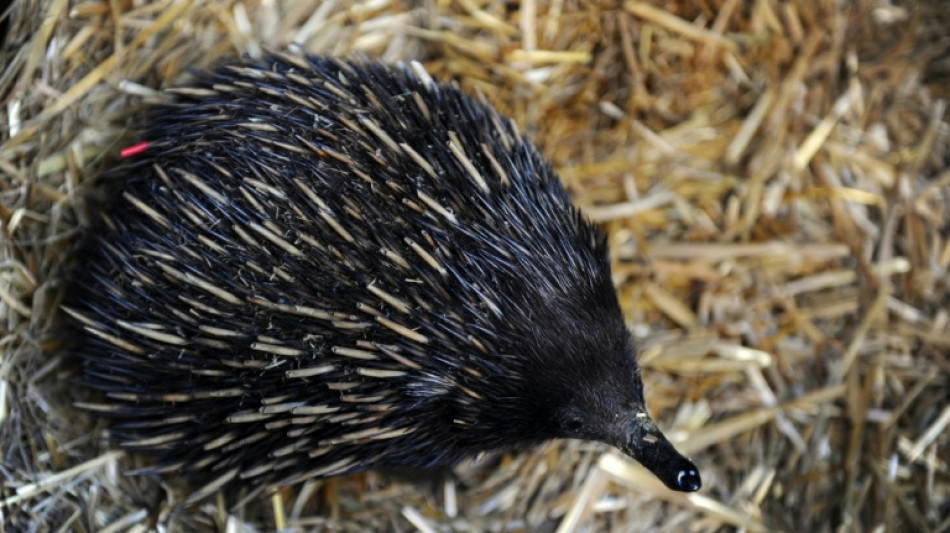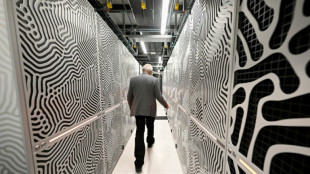
-
 Japa's Miura and Kihara capture Skate America pairs gold
Japa's Miura and Kihara capture Skate America pairs gold
-
Who can qualify for 2026 World Cup in final round of European qualifiers

-
 UK to cut protections for refugees under asylum 'overhaul'
UK to cut protections for refugees under asylum 'overhaul'
-
England's Tuchel plays down records before final World Cup qualifier

-
 Depoortere double helps France hold off spirited Fiji
Depoortere double helps France hold off spirited Fiji
-
Scotland face World Cup shootout against Denmark after Greece defeat

-
 Hansen hat-trick inspires Irish to record win over Australia
Hansen hat-trick inspires Irish to record win over Australia
-
Alcaraz secures ATP Finals showdown with 'favourite' Sinner

-
 UK to cut protections for refugees under asylum 'overhaul': govt
UK to cut protections for refugees under asylum 'overhaul': govt
-
Spain, Switzerland on World Cup brink as Belgium also made to wait

-
 Sweden's Grant leads by one at LPGA Annika tournament
Sweden's Grant leads by one at LPGA Annika tournament
-
Scotland cling to hopes of automatic World Cup qualification despite Greece defeat

-
 Alcaraz secures ATP Finals showdown with great rival Sinner
Alcaraz secures ATP Finals showdown with great rival Sinner
-
England captain Itoje savours 'special' New Zealand win

-
 Wales's Evans denies Japan historic win with last-gasp penalty
Wales's Evans denies Japan historic win with last-gasp penalty
-
Zelensky renews calls for more air defence after deadly strike on Kyiv

-
 NBA's struggling Pelicans sack coach Willie Green
NBA's struggling Pelicans sack coach Willie Green
-
Petain tribute comments raise 'revisionist' storm in France

-
 Spain on World Cup brink as Belgium also made to wait
Spain on World Cup brink as Belgium also made to wait
-
Spain virtually seal World Cup qualification in Georgia romp

-
 M23, DR Congo sign new peace roadmap in Doha
M23, DR Congo sign new peace roadmap in Doha
-
Estevao, Casemiro on target for Brazil in Senegal win

-
 Ford steers England to rare win over New Zealand
Ford steers England to rare win over New Zealand
-
Massive march in Brazil marks first big UN climate protest in years

-
 Spain rescues hundreds of exotic animals from unlicensed shelter
Spain rescues hundreds of exotic animals from unlicensed shelter
-
Huge fire sparked by explosions near Argentine capital 'contained'

-
 South Africa defy early red card to beat battling Italy
South Africa defy early red card to beat battling Italy
-
Sinner beats De Minaur to reach ATP Finals title match

-
 Zelensky vows overhaul of Ukraine's scandal-hit energy firms
Zelensky vows overhaul of Ukraine's scandal-hit energy firms
-
South Africa defy early red card to beat Italy

-
 Alex Marquez claims Valencia MotoGP sprint victory
Alex Marquez claims Valencia MotoGP sprint victory
-
McIlroy shares lead with Race to Dubai title in sight

-
 Climate protesters rally in Brazil at COP30 halfway mark
Climate protesters rally in Brazil at COP30 halfway mark
-
Spike Lee gifts pope Knicks jersey as pontiff meets film stars

-
 BBC caught in crossfire of polarised political and media landscape
BBC caught in crossfire of polarised political and media landscape
-
'Happy' Shiffrin dominates in Levi slalom for 102nd World Cup win

-
 Palestinian national team on 'mission' for peace in Spain visit
Palestinian national team on 'mission' for peace in Spain visit
-
Brazilian 'Superman' cheers child cancer patients in Ghana

-
 India close in on win over South Africa after Jadeja heroics
India close in on win over South Africa after Jadeja heroics
-
Huge explosions rock industrial area near Argentina's capital

-
 Bezzecchi takes pole for Valencia sprint and MotoGP
Bezzecchi takes pole for Valencia sprint and MotoGP
-
Dominant Shiffrin leads after first slalom run in Levi

-
 Nine killed in accidental explosion at Indian Kashmir police station
Nine killed in accidental explosion at Indian Kashmir police station
-
Climate protesters to rally at COP30's halfway mark

-
 Fighting South Africa lose Rickelton after India 189 all out
Fighting South Africa lose Rickelton after India 189 all out
-
Harmer leads South Africa fightback as India 189 all out

-
 Prison looms for Brazil's Bolsonaro after court rejects his appeal
Prison looms for Brazil's Bolsonaro after court rejects his appeal
-
EU bows to pressure on loosening AI, privacy rules

-
 India close in on lead despite South African strikes
India close in on lead despite South African strikes
-
Curry's 49 points propel Warriors in 109-108 win over Spurs


Study sheds light on origin of Australia's odd echidna
Australia's burrowing echidna evolved from a water-dwelling ancestor in an "extremely rare" biological event, scientists said Tuesday in a new study of the peculiar egg-laying mammals.
With powerful digging claws, protective spikes and highly sensitive beaks, echidnas are well suited to a life shuffling through the forest undergrowth.
But a team of Australian and international scientists believe many of the echidna's unusual traits were first developed millions of years ago when its ancestors splashed through the water.
"We're talking about a semiaquatic mammal that gave up the water for a terrestrial existence," said paleontologist Suzanne Hand, from the University of New South Wales.
"While that would be an extremely rare event, we think that's what happened with echidnas."
Echidnas and another Australian oddity, the semi-aquatic platypus, are believed to have evolved from a common ancestor called Kryoryctes cadburyi that lived in Australia more than 100 million years ago.
Researchers studied the single known bone fragment left by this ancestor, which was discovered among a trove of fossils at Dinosaur Cove in southern Australia some 30 years ago.
Platypus bones were similar to this ancient ancestor, Hand said, with a thick and heavy structure that provided ballast for diving.
Echidnas, in comparison, had very thin bone walls that made it easier to walk on land, Hand said.
This indicated echidnas were descended from a water-dwelling ancestor but had evolved to live on land, the research found.
It was far more common for prehistoric mammals to go from land to water, Hand said, pointing towards seals, whales, dolphins and dugongs.
The researchers said these findings appeared to be supported by other echidna traits.
Echidnas have backward-facing hind feet that help them shift mounds of soil when burrowing.
These feet may have first developed as rudders helping the echidna's ancestor navigate fast-moving waterways, Hand said.
Echidnas also have a "diving reflex" when submerged in water, which tells their body to conserve oxygen helping them hold their breath for longer.
Echidnas and platypus are monotremes, a rare group of mammals that lay eggs instead of live young.
"We're hoping we'll discover other ancestral monotremes that will help unravel the early history of this most fascinating group of mammals," said study co-author Michael Archer.
The research was published in peer-reviewed journal PNAS.
M.AlAhmad--SF-PST




